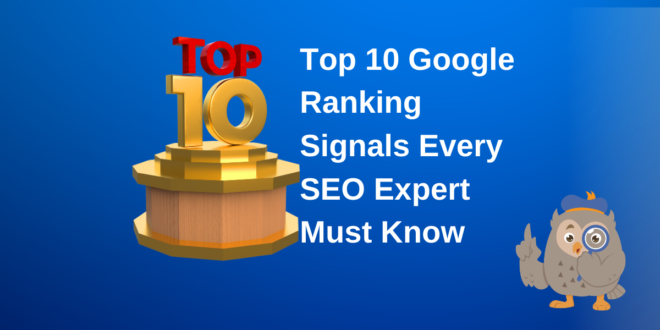To succeed in SEO, understanding Google’s ranking signals is crucial. These signals help Google determine which pages are the most relevant and valuable for specific search queries. Below are the top 10 Google ranking signals that every SEO expert should know:
1. Content Quality
High-quality content that addresses user intent is one of the most important ranking factors. Google’s algorithms favor content that provides value, answers questions, and is well-researched. Optimizing for user experience and ensuring your content is informative can significantly impact your ranking.
For further details, refer to Understanding Core Google Ranking Factors.
2. Backlinks
Backlinks from authoritative websites act as “votes of confidence” for your site. The more high-quality backlinks you have, the higher your chances of ranking well. Quality is more important than quantity, with links from reputable sites carrying more weight.
3. Mobile-Friendliness
With the shift to mobile-first indexing, ensuring that your website is mobile-friendly is essential. Google prioritizes sites that offer a good mobile experience, so a responsive design is crucial for ranking.
4. Page Speed
Google has made it clear that page speed is a ranking factor. Sites that load quickly provide a better user experience and are rewarded with higher rankings. Tools like Google’s PageSpeed Insights can help you assess and improve your page load times.
5. Core Web Vitals
Core Web Vitals measure aspects of the user experience, including loading performance, interactivity, and visual stability. Sites that perform well on these metrics tend to rank higher, as Google values websites that offer a smooth, user-friendly experience.
To dive deeper into Core Web Vitals, check out The Ultimate Guide to Google’s Ranking Factors.
6. User Engagement Signals
Google monitors user behavior signals such as time on site, bounce rates, and click-through rates (CTR). Websites that keep users engaged and provide a satisfying experience are likely to rank higher.
7. On-Page SEO
Optimizing on-page elements such as title tags, meta descriptions, headers, and internal linking can significantly influence your rankings. These elements help Google understand your content’s context and relevance to search queries.
8. Secure Website (HTTPS)
Google favors secure websites, so implementing HTTPS (SSL encryption) is vital. Not only does it improve your site’s security, but it also boosts trust and is considered a ranking factor by Google.
9. User Experience (UX)
Google prioritizes sites that offer a great user experience, including easy navigation, intuitive design, and clear calls-to-action. A positive UX leads to better engagement, which can improve rankings.
10. Social Signals
While the direct influence of social media signals on SEO is debated, social sharing can indirectly impact rankings by driving traffic and generating backlinks. Content that is shared widely on social platforms tends to gain more visibility and can improve its chances of ranking higher.
For more insights into the top Google ranking signals and how they impact SEO, visit Understanding Core Google Ranking Factors and The Ultimate Guide to Google’s Ranking Factors. These resources offer a comprehensive look at how Google’s algorithms assess and rank content.
 High-Quality Backlinks for SEO Success | Backlink eStore
High-Quality Backlinks for SEO Success | Backlink eStore




